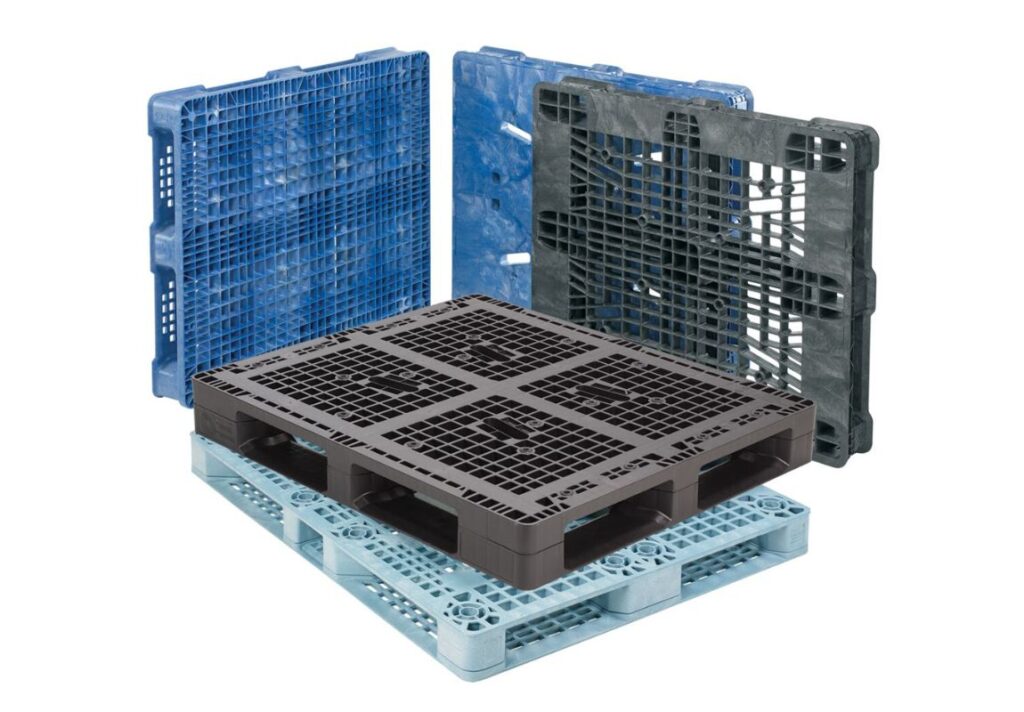Understanding the Role of Plastic Pallets in Logistics
While home DIYers have found hundreds of uses for wood pallets in home decor and design, supply chains are replacing old wood pallets with plastic pallet systems. Storing and handling product loads on a wood pallet leads to issues like broken boards, splinters and protruding nails that result in system downtime and inefficiencies.
The plastic pallet in logistics offers a modern solution to supply chain issues that come with wood pallets. These reusable pallets for logistics offer unparalleled durability for shipping and storing products, especially in the food and beverage, eCommerce and retail industries. Along with being reusable and recyclable, plastic pallets can nest, stack, and rack, providing companies with more options than ever to select the right pallet for their supply chain application.
Common Uses for Plastic Pallets in the Supply Chain
Many businesses use plastic pallets for storage, work-in-process, fulfillment, and distribution, particularly in certain industries. Pallet storage is an integral part of warehouse management and transport solutions for logistics companies that serve the food and beverage or the eCommerce industry. Plastic pallets can handle heavy loads and resist moisture in warehouses and refrigerated trucks, when transporting cold and frozen products.
Many retail business logistics managers choose plastic pallets because they can handle the weight of the products and offer better handling on the delivery truck. These companies need to accelerate and streamline the flow of product while cutting costs, making plastic the ideal material for their pallets. Plastic reusable pallets are dimensionally consistent and offer repeatable performance, in racked warehouse storage, automated cells or in distribution.
Wood pallets can damage the freight, increasing the cost of production and reducing the supply of certain products that could be in high demand.
Benefits of Plastic Storage Pallets vs. a Wood Pallet
With the financial and environmental advantages to choosing plastic pallets over wood pallets, more businesses are choosing durable solutions for transportation and storage. A wood pallet often requires treatment to prevent pests and decay like splinters. Additionally, construction of the pallets includes nails and other steel parts that could corrode over time. The metal fastenings can also split the lumber boards and reduce the pallet’s durability and service life.
Plastic pallets offer substantial benefits for supply chain solutions over wood pallets, including:
- Lower cost of ownership over the lifetime of the pallet
- Innovative use of recycled material
- Resistance to moisture, corrosion, mold, rot, decay and pests
- Easy cleaning, manually or with a pallet washer
- Robust load ratings to meet a variety of application requirements
- A variety of styles, including nestable, rackable, and stackable instead of just block pallets
- Precisely molded to offer dimensional consistency and repeatable performance
- Molding processes including injection-molding and thermoforming
- Strong strength-to-weight ratio
- Available in recycled material
- Long service life
- Ability to be tracked, using RFID and GPS or other technologies
Pallet companies that supply warehouse and logistics customers recommend making the switch to plastic pallets for many types of business customers, including the food and beverage, retail, pharmaceuticals, eCommerce, and automotive industries.
Choosing the Right Pallet in Logistics: Types and Materials
Several types of plastic storage pallets are available to support moving products at any point throughout the supply chain. For example, nestable pallets have legs that stack inside holes, making storage of products, parts, and equipment easy.
Flat stackable pallets and rackable pallets offer simple logistics solutions, including forklift slots on all sides, flat stacking capabilities, and rackable storage solutions for rackable pallets with corresponding accessories.
Plastic pallets are primarily manufactured using high-density polyethylene (HDPE) or polypropylene (PP) resin materials. Each option offers different benefits for the supply chain. Many pallets can also be made with recycled content.
- Reusable plastic pallets are recyclable at end of life and often pallet manufacturers will offer a buy-back program, where they recover, recycle, and reprocess pallets into other useful products.
A company should consider its product load characteristics, plastic material, style of pallet, supply chains systems, and how related logistics can contribute to their transportation, storage, and automated systems. Choosing the right pallets for the products they move through the supply chain can make operations more cost-efficient.

Plastic Shipping Pallets Are a Sustainable Solution for the Logistics Industry
When your company needs to transport goods from the factory to a distribution center, store, or warehouse, how much does the pallet really matter? A sturdy pallet can make the difference between getting thousands of dollars of product out to the sales floor and having to write off thousands of dollars of product as a loss due to damage in transit.
What about your customers? Many consumers are looking for companies that support green initiatives. By choosing plastic pallets that you can recycle at the end of their life cycle, you’re meeting customer demand for eco-friendly supply chain solutions.
Turn to the logistics experts at ORBIS for reusable packing management when looking for solutions for a plastic or recyclable pallet in logistics for your supply chain management. Check out our pallet solutions, and request a quote today to start saving money and the environment with every pallet!

